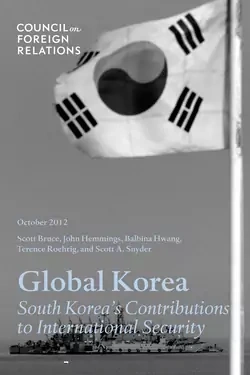
Global Korea
South Korea's Contributions to International Security

- Report
Overview
Over the past few years, South Korea has become an active contributor to international stability through its "increased participation in peacekeeping, antipiracy, postconflict stabilization, counterproliferation, and other activities," writes Senior Fellow Scott A. Snyder in a new CFR ebook Global Korea: South Korea's Contributions to International Security.
This volume outlines South Korea's progress toward raising its international profile. Authors who contributed essays in the compilation are:
More on:
- Balbina Hwang, of Georgetown University, on South Korea's participation in international peacekeeping, including an analysis of its capabilities, and how the South Korean public views its contributions.
- Terence Roehrig, of the U.S. Naval War College, on South Korean contributions to antipiracy operations in the Gulf of Aden.
- John Hemmings, of the Center for Strategic and International Studies, on the Provincial Reconstruction Team South Korea established in Afghanistan and the civilian-military coordination challenges that accompanied that operation.
- Scott Bruce, of the Partnership for Nuclear Security at CRDF Global, on South Korea's commitment and capacity to implement counterproliferation operations.
Snyder also lays out potential obstacles to South Korea's aspirations in the global security arena:
- The possibility that "a significant flare-up of inter-Korean tensions or destabilization of North Korea could cause a shift in resources back to the Korean peninsula."
- The South Korean presidential transition in February 2013 might test its "political commitment to maintain active contributions to international security."
- South Korea will face demographic and budget constraints in the midterm that could eventually reduce its ability to contribute toward international security. For example, the country's low birth rate may limit available manpower to serve in the military.
Chapter Downloads
- Korea and PKO: Is Korea Contributing to Global Peace? [323K PDF]
- South Korea's Counterpiracy Operations in the Gulf of Aden [514K PDF]
- The ROK Provincial Reconstruction Team in Afghanistan [454K PDF]
- Counterproliferation and South Korea: From Local to Global [349K PDF]
- Endnotes [376K PDF]
More on:
 Online Store
Online Store
